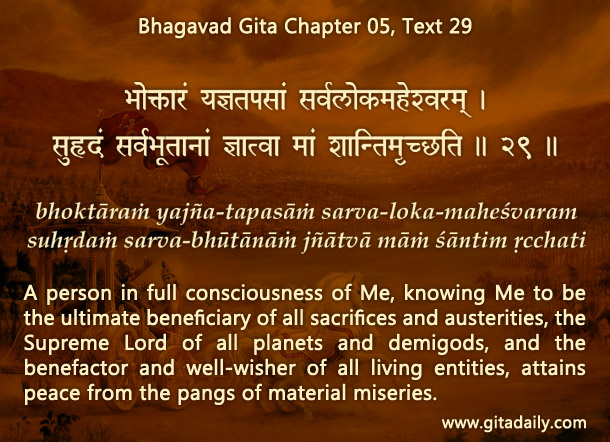 Teleology refers to ‘the perception of purposeful development towards an end.’ (American Heritage Dictionary) ‘Life is teleological’ means that whatever happens in our life is meant to serve a purpose. That purpose, Gita wisdom explains, is our spiritual evolution.
Teleology refers to ‘the perception of purposeful development towards an end.’ (American Heritage Dictionary) ‘Life is teleological’ means that whatever happens in our life is meant to serve a purpose. That purpose, Gita wisdom explains, is our spiritual evolution.
We are at our core souls meant to rejoice constantly in pure love for Krishna. Our present human life is a precious opportunity to evolve towards that love by leading a Krishna-centered life.
During our life, things happen that just don’t make sense. At such times, when our logical faculty fails to guide us, we can find light by meditating on life’s teleological purpose.
Over time, as we heal and blossom spiritually, we will realize how he has magnificently, mysteriously, magically brought even bad things to an ultimately good end.
No matter what happens, Krishna is always the supreme controller. And more importantly, he is always our supreme benefactor, as the Bhagavad-gita (05.29) declares. Even if things seem all wrong, he can and will expertly orchestrate them for our long-term benefit if we just cooperate with him.
How do we cooperate?
By continuing to serve Krishna according to our best intelligence and capacity. The Mahabharata (Drona Parva) assures, “The Lord’s inscrutable will is meant for the world’s welfare. If you simply follow His will, then you will understand in time.”
Why can’t we understand immediately?
Because our intelligence is finite, whereas his is infinite. He works at a level too profound for us to fathom – somewhat similar to how a doctor may treat by a surgery too complex for a patient to understand fully.
Just as a patient can tolerate and cooperate by remembering the doctor’s benevolent purpose, similarly we can tolerate and cooperate if we let Gita wisdom reinforce our remembrance of Krishna’s unfailing benevolence. Over time, as we heal and blossom spiritually, we will realize how he has magnificently, mysteriously, magically brought even bad things to an ultimately good end.


Very enlightening article.
Indeed Krishna is directly guiding you to share this profound wisdom.
Thank you very much for writing and sharing with us.